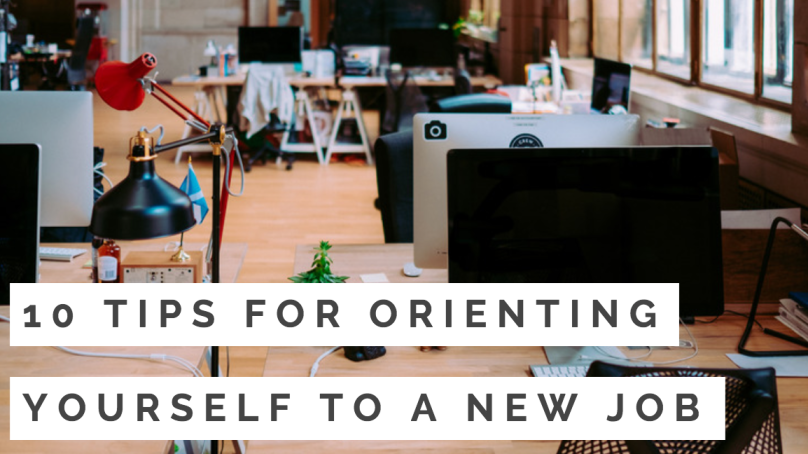10 Tips for Orienting Yourself to a New Job

I started my first training-wheels-off job last Monday and most things are different from where I trained. The culture, the people, the protocols, etc. As a resident, I was one of the Chief Residents for Orientation where I helped coordinate on-boarding 35 Pharmacy Residents. With my specialty training I also coordinated on-boarding of new Managers while on rotations, and had lectures on the importance of getting a good start as part of my Masters degree.
An effective orientation is like getting a good first impression. It can say a lot about an institution's overall organization and how engaged your hiring manager is. A quality orientation experience can improve employee retention and engagement in the long run. This means less employee turnover and apathy, better team morale, and cost savings (training is expensive!).
With all of the didactic training and coordination of orientation schedules/experiences for others, it's time to create the effective experience for myself. One of the most empowering lessons that I learned from my mentors is to prepare to orient yourself. Own it!
Below are 10 tips that I will be implementing for at least the next few months.
1. Keep an open mind. You don't know what you don't know. Seek to understand. All of these phrases basically mean, shut up and listen. Don't kid yourself thinking that you know, well, anything. It's a great place to be for now - embrace it.
2. What got you here won't get you there. Similar to the previous one, don't think that the knowledge you had that got you hired is what is going to make you the most successful. Keep your cards to yourself until you understand the organization first. Blow their minds with your abilities after you've earned their trust.
3. Focus on building relationships. You are not a one person show. If you are onboarding to a new organization, large or small, everyone has a place. And relationships are key. Get a feel for who you can go to for certain needs, who could be a mentor, and who can collaborate with in the future.
4. Get lost. Try to find places on your own (but don't be afraid to ask for directions so you're not late!). By walking places on your own instead of having someone escort you, you'll get lost less in the long run. And you may even find some secret spots to have lunch in solitude.
5. Bring paper and pen. It still sets a good first impression than taking notes on a mobile device. I always start with writing things down in my moleskin notebook until I see examples of otherwise.
6. Under promise and over deliver. Your career is a marathon, not a sprint. All of my mentors have advised not to join too many committees, promise too many deliverables to start, etc. Be a productive and effective team member and understand the culture/politics around you. When the time is right, flex your muscles.
7. Trust the process. Remember that while all organizations have room for improvement, you do not have the historical context behind decisions that give you the bandwidth to make any change recommendations just yet. Trust the process, keep notes of what went well and what didn't, and when the time is right discuss these opportunities with your hiring manager.
8. Communicate. Over communicate with your hiring manager. The more you communicate now, the more trust you will build with your boss. Communicate when you are unsure. You will likely have different people orienting you throughout the process and people will over- or under-assume you know anything. Tell your trainers upfront where you are in the process, and don't let them assume you know something you don't. On the other hand, don't let your trainers speak too long about things you already know because that wastes everyone's time. Speak up for yourself - this is your time and sets the platform for the rest of your time at the institution.
9. Build good habits from day 1. This is your opportunity to set your environment within appropriate bounds. Your email is empty so you can start your organization system from scratch. You can create your boundaries for working after hours/weekends now (unless your boss has different expectations). If you build good habits now, it will help in the long run for resilience in the workplace and happiness at home.
10. Start with the basics. Learn where the bathroom is, how to clock in, make sure you get paid.
Stay tuned to see if these tips worked for me in the long run. I hope some of these will work for you.

Comments powered by Talkyard.